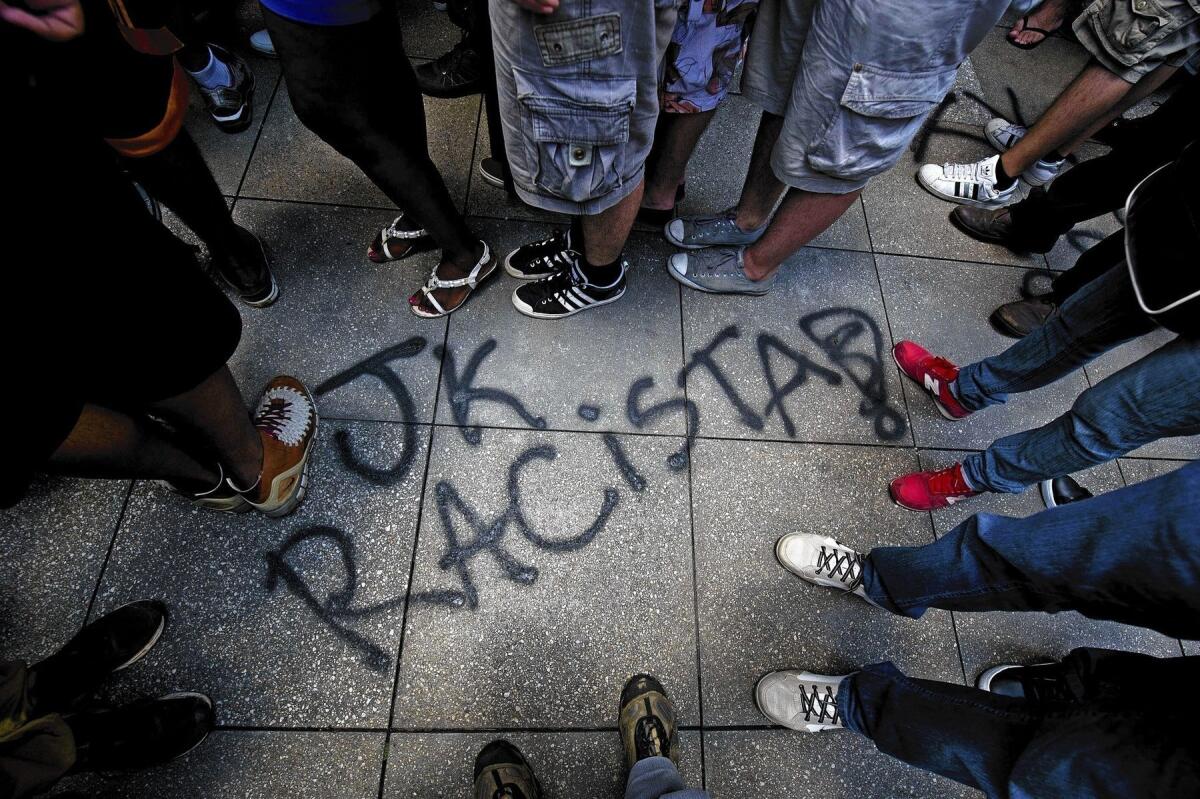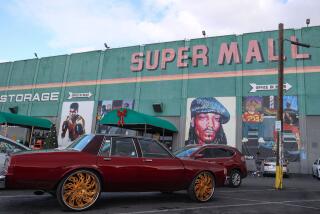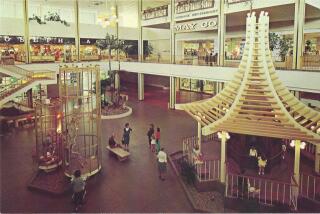Brazil shopping malls become centers of controversy

- Share via
SAO PAULO, Brazil — As Brazil’s economy powered forward over the last decade and millions rose out of poverty, shiny new shopping malls popped up as testament to a more prosperous society.
In these temples of consumption, well-to-do families and couples stroll gleaming hallways, popping in and out of stores to browse $300 boxes of macaroons or shoes costing thousands of dollars. The only dark-skinned faces present, in a country where more than half of the people identify themselves as black or brown-skinned, have been those of security guards, workers or the women busing Burger King trays at the food court.
But now, the high-end malls are the focus of heated political protest and, for some, proof of how far the country still needs to go to overcome centuries-old racial and class divisions.
Groups of mostly dark-skinned and working-class youths in Sao Paulo began organizing last month on Facebook to meet and hang out at malls. Thousands showed up, singing and flirting in the halls. Mall operators reacted by banning further rolezinhos, Brazilian Portuguese slang for “taking a little stroll,” but sometimes translated as “flash mob.”
The crackdown included what some claim was police abuse and racial profiling and led to a proliferation of now-politicized rolezinhos around the country, as well as protests targeting malls deemed to be fortresses for Brazil’s white elite.
“We just wanted to get together, meet new people, have an ice cream or snack and do the things all kids like to do,” said Jefferson Luis, an office assistant and musician who organized an early rolezinho in Sao Paulo. “But the malls were uncomfortable with us, as they weren’t used to seeing so many lower-class youths in their environment.”
Luis, 20, is older than most who attended his event. For the most part, the worst the kids have been accused of is minor offenses such as blocking escalators, being too loud or disturbing the shopping environment.
But the response has been aggressive, both among other mall-goers and security officials.
“These youths decided to call attention to themselves, yelling and making a commotion,” said Fernando Ricciarelli, 35, who works as a financial director in Sao Paulo and says he wouldn’t want a rolezinho in the mall where he eats lunch almost every day. “This scares the people in the mall who want peace and quiet so they can do their shopping.”
Meanwhile, video taken by local news media in January showed youngsters fleeing tear gas or being threatened by police.
As Brazil prepares to put its best face forward in preparation for hosting the World Cup in June, the protests are the second within a year involving alleged overreaction by authorities. Last June, a violent crackdown on a protest against a bus-fare increase in Sao Paulo sent more than a million people into streets across the country to call attention to government corruption and poor public services.
The rolezinhos have prompted city, state and federal authorities, including the president, to call emergency meetings to formulate a quick response plan.
On Jan. 18, a protest shut down the JK Iguatemi mall, a luxury shopping center in Sao Paulo.
“Poor youths have no public spaces for culture or leisure where they live, and when they try to use malls, their only option, there is a prejudiced and racist response,” said protest organizer Douglas Belchior of UNEafro, an organization that seeks to provide educational opportunities for blacks and the working class. “The malls have put in place injunctions which amount to racial segregation.”
Soon after the rolezinho controversy began to dominate headlines, young people pointed out that elite university students have long been organizing flash mobs in malls — with largely rich, white participants — without incurring the ire of authorities.
The rolezinho participants wear their Saturday best — and they say one of their main reasons for showing up was to meet members of the opposite sex. The boys often wear baseball caps bearing logos such as Quiksilver, polo shirts, shorts, gold chains and sneakers. Girls generally wear shorts. Their singing, which sometimes appears to overwhelm frustrated security guards, is usually a version of “funk,” a musical genre born in poor slums that has recently taken a turn toward affirming bling and consumer culture.
In a nation whose economy has been kept afloat of late by an explosion in consumption, glitzy new shopping malls serve as meeting places for the elite, and new malls are springing up in lower middle-class neighborhoods. Protest organizers say it is no surprise that youngsters would congregate in these spaces rather than the slums in which many live.
“Our poor youths are largely barred from university because of their background. But they have been educated to consume,” Belchior said. “The shopping mall is the grand symbol of our culture of consumption and acquisition.”
“We in the elite don’t know how to communicate with the rest of the country,” said Miriam Berton, a 51-year-old music teacher waiting in front of the movie theater at JK Iguatemi, where patrons lined up to pay $21 to see “The Wolf of Wall Street.” “The people here, we are privileged. We have a responsibility to the rest of the population. We should invest in culture and encourage the kids to come here and sing and dance.”
Brazil’s recent growth has somewhat narrowed the gap between rich and poor, but the country remains one of the most unequal. The left-leaning Workers’ Party, in power since 2003, has implemented quotas to increase racial and socioeconomic diversity in colleges, a measure that has stirred political controversy.
But the poor still lack healthcare, housing and access to education.
After initial confusion and a public backlash, mall operators are asking the government to provide alternative gathering sites in poor parts of the city, where public space and cultural centers are mostly nonexistent.
“Everyone is welcome, but the arrival of thousands of people at the same time compromises the security of these establishments,” Nabil Sahyoun, president of Brazil’s Shopping Mall Store Assn., said Wednesday in a news conference with Sao Paulo government officials.
Jefferson Luis, who plans to return to school, hopes the accidental politicization of the mall gatherings may lead the government to offer much-needed improvements.
“As long as the city doesn’t do their job, the kids are going to find their own way to spend leisure time,” he said. “And right now, that’s the rolezinhos.”
Bevins is a special correspondent.
More to Read
Sign up for Essential California
The most important California stories and recommendations in your inbox every morning.
You may occasionally receive promotional content from the Los Angeles Times.













